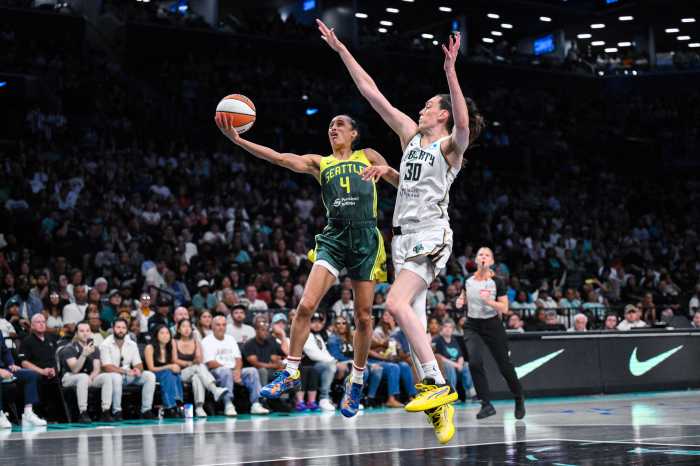If Queens was a separate city, it would have rejected the anti-war resolution passed by the New York City Council last Wednesday, March12.
Although the resolution, No. 549-A, was approved by a comfortable margin of 14 votes (31-17), more than half of the "no" votes belonged to the Queens delegation.
The vote was little more than an expression of the legislative bodys opinion about the dominant international issue of the last six months should the United States wage a preventive war against Iraq without the support of the United Nations?
Ultimately, the Councils opinion holds no sway over the decision to go to war, yet this vote produced the largest split on any issue since the mostly freshman group of legislators took office last year.
It also followed months of bickering and hand-wringing over the exact wording of a resolution. The original version, introduced by Councilman William Perkins in October, criticized the Bush administration for failing to make a strong case for war.
Now, the wording is intentionally vague, suggesting that war only be a last resort, when "other options for achieving compliance with United Nations resolutions" have failed or "it is demonstrated that Iraq poses a real and imminent threat."
This language has enabled Queens Council members to offer individual interpretations of what a "no" vote or "yes" vote actually means.
For some, rejecting the resolution was simply a rejection of the Councils decision to meddle in foreign policy.
"This was watered down to the point that it was meaningless," said Councilman Joseph Addabbo Jr.
"We were elected to deal with city-related services. The city has a budget crisis going on, and here we are wasting time on an area in which we have no jurisdiction."
At least one Council member, according to sources, is considering introducing legislation that would place a limit on the bodys ability to debate international matters in the future. But many still feel the Council needs to make itself heard on the question of war.
"Its on everybodys mind," said Councilman Leroy Comrie, who voted for the resolution. "If we didnt express an opinion, it would be a sign that we were not in touch with what is happening in our communities."
Councilman Peter Vallone Jr. was conflicted about the timing of the vote, coming as it did amid the citys fiscal woes. Yet New York City is the "capital of the world," he said, "and our opinion matters."
The symbolism of this resolution, passed in a building only blocks from the site of September 11 terrorist attacks, was not lost on the worlds news media, with TV crews from CNN and networks in Japan, Germany and France crowding the Council chambers at City Hall last week.
"It was a very unusual day," said Vallone. "I did an interview with a Florida radio station and the Washington Times."
Symbolism, however, was exactly what he and other Queens Council representatives had in mind when they voted against the resolution.
"How quickly weve forgotten the horrific attacks of 9/11. If we wait, we wont have enough streets to name after the victims of the next attack."
Iraqs Saddam Hussein not only supports terrorism, said Vallone he is a terrorist.
Councilman Allan Jennings held up a picture of a deceased friend, Frank Lin, during the floor debate last Wednesday. Lin, the councilmans campaign treasurer, was on the 89th floor of tower one on the morning of September 11.
The decision to go to war, in his mind, was made on that morning, and the Council should be showing its support for the soldiers already stationed in the Persian Gulf.
"As an elected leader, its my duty to stand by my country in a time of war," he said. "This resolution sends the wrong message to the troops."
He and Vallone both pointed out that there is an Army encampment in the Kuwaiti desert called "Camp New York." What, they asked, would soldiers at that camp think of the Councils resolution?
But others balked at the suggestion that some Council members were wavering in their support for the armed forces.
"I want to protect our troops," said Comrie. "Id rather they enjoy their time in the sun, and not have to fight a war."
"I think the entire City Council has respect for the men and women that are going to be over there fighting," said Councilwoman Melinda Katz, who voted against the resolution. Her concern is that some members of the United Nations Security Council do not have the "best interests" of the US "at heart."
Still, argued Comrie, the Bush administration has not been "decisive" in presenting evidence of a clear danger to American interests.
"If they have proof, then they should show it," he said.
Why did the Queens delegation split with other parts of the city? Some Council members noted that their Manhattan colleagues who all voted for the resolution had fielded hundreds of anti-war calls from their liberal constituents.
In contrast, many Queens representatives received far fewer calls. But those that did come in were largely against the resolution.
"Support for Bush is running high in my district," said Vallone, arguing that a "silent majority" exists throughout other parts of the city as well.
"The people that opposed this did a good job of making their views known."





























